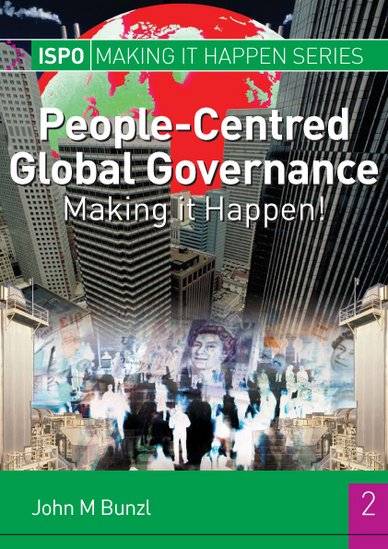
People-centred Global Governance
2. People-centred Global Governance - Making it Happen!
by John Bunzl
The Making it Happen! series of books is published by ISPO.
Summary
As global problems such as global warming, global poverty, pollution, terrorism and runaway corporate power increasingly outstrip the capacity of national and international governance institutions to solve them, the issue of global governance is rapidly moving up the international political agenda. In this book, Bunzl draws on the work of a number of leading evolutionary thinkers to show that both the process of globalisation itself, and the evolution of a binding system of global governance, are natural parts of human evolution.
The central dilemma of achieving a healthy form of global governance, Bunzl shows, is that its implementation must be by popular consent, and yet it must also be consented to and implemented by nation-states. For only nation-states have the authority and capacity to do so. But present inter-governmental efforts to solve global warming and other global problems are proving wholly inadequate and are showing the nation-state system to be incapable of such a move. The solution, Bunzl argues, is to devise a way for global citizens to use their votes in their respective national elections to drive their politicians and governments to implement global governance and to do so in a way that does not require nations to act against their own self-interest. Furthermore, he presents the Simultaneous Policy as one means by which this can be achieved, arguing it to be the world's first genuine form of global electoral politics.
Beyond this, if the evolution of global governance is a natural, albeit by no means assured, evolutionary phenomenon, Bunzl argues that any organisation purporting to become the world’s over-arching institution of global governance would likely have to display characteristics which are in substantial accord with the dynamics of evolutionary transformation. These dynamics have, after all, already been set out very clearly by the prominent American philosopher, Ken Wilber, in his “20 Tenets of holons and holarchies". The value of Wilber’s 20 Tenets is that they provide reasonably objective criteria against which to analyse and compare the various existing and emergent global governance initiatives (as well as existing institutions such as the United Nations) to assess their potential, or otherwise, for evolving to become the world's organisation of binding global governance.
Bunzl proceeds to analyse the International Simultaneous Policy Organisation (ISPO), tenet by tenet, making a convincing argument as to its congruity with Wilber's Tenets and its potential for effecting global transformation at all levels of the human social holarchy towards a system of people-centred global governance. ISPO is also briefly viewed from Wilber's "all-quadrant, all-level (AQAL)" standpoint and ISPO's progress in the real world is also discussed, showing that it is already in the process of its own becoming.
By analysing ISPO in this way, Bunzl lays down the gauntlet - a challenge - to all other would-be global governance initiatives to declare themselves in similar fashion. From such a debate, both those with a special interest in globalisation and governance and the wider public will be able to see which initiatives have the potential to succeed and thus merit our active involvement and support.
Endorsements
A systemic and ingenious strategy for applying people power in all countries to encourage their politicians toward ‘win-win global solutions’.
Hazel Henderson, Author, Building a Win-Win World and Planetary Citizenship
Simultaneous Policy (Simpol) is an evolutionary imperative in a competitive world that now demands new forms of co-operation in order to address global issues that cannot be resolved by one nation alone. In this new book John Bunzl analyses some key aspects of governance and sets Simpol in the context of transformative evolutionary change in our economic and political systems. The book is a timely contribution to continuing debates about structures and processes of global governance, showing exactly why our current international institutions are not fit for purpose.
David Lorimer, Editor, Network, the magazine of the Scientific & Medical Network
In an age when our problems are global and national governance structures are weakened and inadequate, it is absolutely necessary to think about the shape of effective global governance. This cannot be simply national government "writ large" for that would also enlarge the problems and inefficiencies of national governance. It must be a holistic and evolutionary governance system, and to the articulation of the essential features of such a system John Bunzl's book makes a major contribution. Highly recommended reading for everyone concerned with our collective future on this small and largely mismanaged planet.
Dr. Ervin Laszlo, Futurist, author and systems theorist. President of Club of Budapest
John Bunzl convincingly demonstrates that if you want to contribute consciously to the successful advancement of the evolutionary process on this planet, you should support the Simultaneous Policy. The Simpol is a powerful and practical means of actualizing the next great step in evolution on earth - the formation of a cooperative and sustainable planetary civilization.
John Stewart, Author, Evolution’s Arrow – the direction of evolution and the future of humanity
This publication presents a unique long term approach to governance and environmental issues. It offers solutions based on the concept of unity in diversity. As such it is bound to produce controversy and debate!
Diana Schumacher, Former President, The Schumacher Society
Download book for free [PDF 1.5MB]
Hard copies are also available. Please contact info@simpol.org for details.

